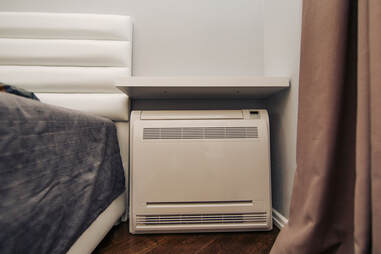The Pros and Cons of Window Wall Air ConditionersKEY TAKEAWAYS:
 Window Wall Air Conditioners - HVAC Solutions Window Wall Air Conditioners - HVAC Solutions
When it comes to keeping our homes cool and comfortable during the scorching heat of summer, there's no doubt that air conditioning is a modern marvel we've all come to rely on. But with so many options available, how do we choose the best cooling solution for our spaces? One contender that's been making waves is an oldie, but a goodie: window wall air conditioners. In this article, we'll dive into the pros and cons of this cooling companion, helping you make an informed decision for your home.
Pros:
Ease of Installation: Window wall air conditioners are a breeze to install, especially if you're handy with tools or have a knack for DIY projects. All you need is a suitable window opening and some basic tools. Once set up, you'll enjoy immediate relief from the sweltering heat without the hassle of complex installation procedures.
Space Efficiency: In homes where floor space is limited, window wall air conditioners are champions. They take up minimal interior space since they're mounted directly in the window, leaving your precious square footage untouched. This makes them a superb choice for apartments, small bedrooms, or rooms with limited layout options. Energy Efficiency: Many modern window wall A/C units come equipped with energy-saving features, helping you keep your electricity bills in check. Look for models with programmable thermostats, sleep modes, and energy-efficient settings that can automatically adjust cooling levels based on the room's temperature. Affordability: When compared to central air conditioning systems or even some split units, window wall air conditioners offer a more budget-friendly option for cooling your living space. They provide a cost-effective solution that doesn't compromise on comfort. Flexibility: If you're a renter or someone who frequently moves, window wall A/C units are the cooling choice for you. Since they're easy to install and uninstall, you can take your cooling companion with you wherever you go, ensuring you remain comfortable no matter where life takes you. Cons:
Aesthetic Impact: While window wall air conditioners are undoubtedly functional, their aesthetic appeal might not be everyone's cup of tea. They can disrupt the exterior appearance of your home, affecting the overall curb appeal. If maintaining your home's visual harmony is a priority, you might need to compromise a bit in this department.
Limited Cooling Range: Window wall systems are designed to cool specific rooms or areas. If you have an open-concept living space or multiple rooms you want to keep cool, you might need multiple units to ensure consistent comfort throughout your home. This can lead to increased costs and potential noise levels. Noise Levels: On the topic of noise, it's important to note that some window wall air conditioners can be a bit noisy, especially older models. While manufacturers are continuously working to reduce noise levels, it's wise to consider the noise factor and read reviews before making a purchase. Installation Constraints: While installation is generally straightforward, not all windows are suitable for window wall systems. Improperly sized or positioned windows might limit your options, potentially forcing you to explore other cooling alternatives. Cooling Limitations: Window wall A/C units might struggle to provide adequate cooling during extremely hot days, particularly in regions with intense heatwaves. If you live in an area where temperatures frequently soar, you might need to supplement your cooling with additional methods. Need Help Deciding? Let Us Help You Find the Perfect Air Conditioner for You!
Window wall air conditioners offer a compelling blend of convenience, affordability, and energy efficiency. But they may not be a great fit for everyone. Whether you’re a homeowner or a business owner, we’ll help you find out if a window wall air conditioner is right for you! Contact us today to request an appointment, and let our experts help you find the perfect air conditioner for your home or office!
0 Comments
Leave a Reply. |
|
HVAC Solutions
655 Elkton Drive Ste 200 Colorado Springs, CO 80907 Phone: 719-548-8880 Fax: 719-548-1853 A Full Service Residential and Commercial Furnace, Heating and Air Conditioning Company |
Privacy Policy | Terms and Conditions | Sitemap
©
HVAC Solutions, Inc.
|
